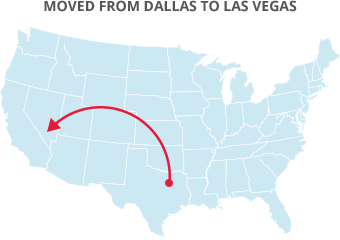


If you've bought a new house you've probably visited the city and spent some time online getting to know the new neighborhood, checked out schools, and figured out the closest coffee shop. Now comes the nitty-gritty of the interstate move--the logistics and details that are so easily lost amongst the angst of the stacks of boxes.
Determine Your Budget
Moving is expensive. If your move is corporate and it's not on your dime, skip ahead of the class. If you're footing the bill, be aware that all moving companies are not created equal and do your homework before you decide how to manage a move and which company to hire. Ask around for recommendations, but confirm the company you choose is a member of the Federal Motor Carriers Safety Association (their license number will be on their website and trucks). The Better Business Bureau is another good resource for quality moving companies.
Figure out your budget for the move before you get started. You can save money by doing your own packing and driving, and hiring labor to load and unload the trucks. Most movers provide a menu of services and you can pick and choose which ones you want. This is a great way to go if you're comfortable packing some things, but want help with things like electronics and antiques.
Reputable companies won't give you a quote without knowing exactly what you're moving and how far. So, schedule an in-home visit and discuss with the estimator exactly what you're planning on moving. Be sure to get a written estimate, look it over closely and ask questions if there are numbers or details that are confusing.
Plan Your Packing
It's like eating an elephant, take it one bite-or box-at the time. Start purging as soon as you know you're moving. If you haven't used it or worn it in six months, donate it, sell it, or throw it away. If your movers are packing for you, it's a lot easier to be savage with the purge when you ask yourself if something is worth paying someone else to wrap and pack it.
Be mindful of your new life--if you're moving from Minnesota to a tropical climate, leave the polar fleece and snow boots with your neighbor. They'll come in handy when you visit and be utterly useless in place where 65 is considered a cold snap. Pack your out of season clothes and toys first, and work your way up to the necessities. A couple of days before the move itself, pack a duffel bag with the essentials for the day or two you're in transit.
 Transporting the Transportation
Transporting the Transportation
If you're moving across the country and flying your family, make sure you let the movers know they'll be transporting vehicles, boats, golf carts, covered wagons--whatever's on wheels, it's got to go on the truck unless you're driving it. When pets are part of the family, sometimes it makes sense for a couple of you to drive with the animals. Consult your vet and check with airlines about pet policies as soon as you know you're moving. Also, coordinate with the movers on the time allotted for transportation, especially if you're going by air. If your sofa and TV are a week behind, you'll need a place to stay in the interim, and the sooner you make those plans the better, particularly with animals involved.
M-Day Minus 14 and Counting
The last few days before you close the door for the last time is a flurry of activity, make sure you check these things off your list.
DON'T PUT THAT ON THE TRUCK!!!
There are some things that common sense dictates shouldn't go on a moving truck. If you're nervous about driving with a full gas can for the lawn mower in the car, think about loading a moving truck with lawn equipment, fertilizer, and bleach and taking off across country. So, in case you need a reminder, here are some things that movers are not allowed to transport.
Establish Domicile
This means letting the new state know you're coming. You'll need to start paying taxes in your new state as soon as the ink dries on your new mortgage. Let your accountant know you're moving--some states don't have state income taxes! Each state has their own tax rates, regulations, and assorted unique laws. Check your new state's website for information on licensing pets, teenage drivers, and other arcane legalities you'll need to know. Once you've moved you'll need new drivers’ licenses and car tags--check to see what the grace period is for new residents. In most states you can register to vote at the DMV; again, check the state website to determine the deadline for signing up to be a good citizen.
And, now that you've got this interstate move thing well in hand, focus on the important stuff--like deciding your new favorite teams.

